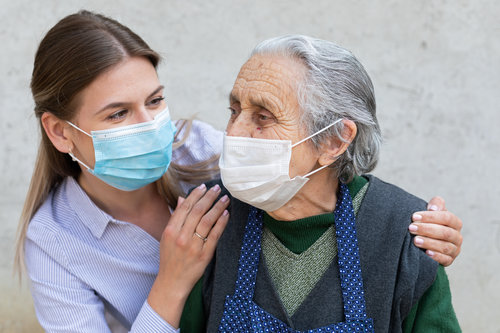
360 SHS was featured in the Bedford Bulletin again! The article titled “360 Seniors Helping Seniors fight Covid-19” shares information on how 360 SHS is preventing and fighting Covid-19.

360 SHS Featured in Bedford Bulletin for Fighting Covid-19
Here is the article in full:
Bedford’s 360 Seniors Helping Seniors owners Judy and Randy Loubier have adjusted their business’ caregiving efforts, and offer advice for those looking to show love and support for their elderly loved ones from a distance.
Since the initial outbreak of Covid-19 on the East Coast, the Loubiers, who have always had clear expectations and training in infection control and standard precautions, have further increased training and communication to caregivers.
The first step was daily monitoring of their caregivers and receivers to ensure that anyone giving or receiving services was not sick, showing any symptoms of the virus, or had traveled.
As New Hampshire issued a stay-at-home order, the Loubiers realized more preventative steps needed to be taken. They became engaged with daily check-ins with the CDC, weekly Department of Health updates, and fluid adjustments of protocols as required.
As a business that provides seniors with care from their peers, 360 SHS sets itself apart from the competition by aiming to build lasting relationships and bonds between caregiver and receiver. The Loubiers have always carefully matched caregivers with their receivers in the hopes they will both form a genuine connection.
Since the outbreak, fulfilling the mission of their business has become even more important. Seniors are a high-risk demographic for Covid-19, because many of them suffer from pre-existing conditions that compromise the body’s ability to fight off the virus, and keeping seniors at home and cared for decreases their vulnerability.
The Loubiers ramped up their monitoring measures. Caregivers and receivers who were showing any signs of sickness or had a risk of exposure were directed to local health officials for screenings, every caregiver is given masks and hand sanitizer to ensure safety. Gowns and protective eyewear are available.
Daily caregivers answer questions about symptoms and travel. Because the Loubiers service many seniors with complex medical conditions and cognitive impairment, most services have been considered essential, and home visits continue for more than 75 percent of their clients. New assessments continue as local hospitals, and rehabilitation facilities strive to keep the vulnerable elderly at home.
“Seniors need our support now more than ever before. With their own families staying at home, our seniors are more isolated than ever. Because our services are considered essential, our caregivers are on the frontline. They are dedicated to keeping their client safe, healthy, and feeling cared for.”– Judy Loubier
For family members nearby or those in the community, there is nothing like a handwritten letter, a Facetime or Skype call, or groceries delivered to a front step.



